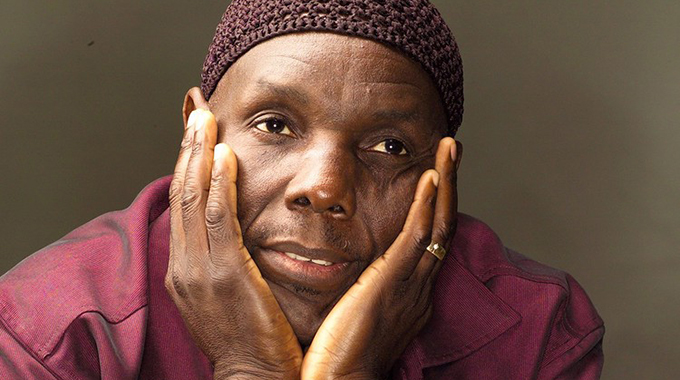Tuku in the eyes of the media

Kundai Marunya Arts Correspondent
Oliver Mtukudzi’S influence permeated society with all its different layers and those who followed his work closely believe he had a song for everyone and about everything. Every strum of a guitar string, every melody and echo from his husky voice would massage people’s emotions and memories differently.
Ever humble, Tuku, as the late national hero was affectionately known, had a trademark laugh and his versatility made it impossible to treat his personality with a single interpretation.
After four decades in the limelight, many people have obviously drawn a picture of who they thought Tuku was to them until he died on January 23 last year, exactly a year today.
Discography
Mtukudzi was born in 1952 in Highfield, Harare. His journey started at a very young age when he would strum his home-made guitar for onlookers.
He obviously inherited the music genes from his late parents who were both musicians.
These are the genes he passed on to his children, most of whom have had successful careers, all working with their father at some point in their careers.
Tuku’s professional music career started at the age of 23 in 1975, when he released his debut single “Stop After Orange.”
This was at the time he had joined Wagon Wheels, a band which included Chimurenga music singer Thomas Mapfumo.
The band did not last long, with Tuku taking on a solo career to record “Nhamo Dzandimomotera” in 1977. The song stayed on the charts for 38 weeks, 11 of those on pole position.
A year later saw Tuku forming The Black Spirits and the release of his debut album “Ndipeiwo Zano.”
When he passed on last year, his discography included 66 albums. He was working on the 67th at the time of his death.
During the course of his career, Tuku took themes relevant to social issues of the time, thus in the 80s he sang songs in celebration of independence, and sang about HIV and AIDS in the 90s.
This is why his music remains relevant even in death. He sang for the people and about the people.
Stage work and performances
Tuku was probably the most travelled musician of his generation, performing on different world stages.
Even at the time of his death, he had several shows booked and he was still very energetic and raring to go.
On stage, Tuku would pick songs from his rich discography, dispensing them with the right mood and his signature Katekwe dance would always leave his audience awestruck.
Even with his very high profile, Tuku always found time to perform for the less fortunate.
At his Pakare Paye Arts Centre, he would sometimes perform as a surprise guest along with his protégés at a minimal fee.
One of his most touching acts was on his last birthday.
On that day, Tuku just drove around with his manager looking for a wedding ceremony.
When they finally came across one, he humbly asked the couple and their parents if he could perform for them free of charge.
His performance left many streaming tears of joy.
Accolades
Tuku had a huge trophy cabinet for an acclaimed world star that he was.
Picked from different countries and continents, it still remains hard to quantify the number of accolades that he was honoured with, some of which are still coming a year after his death.
He bagged accolades that included the prestigious Cavaliere of the Order of Merit Award from the Italian government, while the South African Ministry of Arts and Culture awarded him the “Outstanding Life Long Contribution to the South African Music Industry”.
He also received the Reel Award Winner for Best African Language, a KORA award for Best African Male Artiste and Life Time Achievement, and a Life Time Achievement Award by NTM Global Promotions (Canada).
Humanitarian Work
It was easy to align Tuku with humanitarian work as his music was always an instrument against social injustice and an advocacy for development.
His songs spoke against wars, sexual abuse, gender-based violence and for human rights in general.
He sang about HIV and AIDS at a time when many shied away from the subject, yet many of his fellow musicians had succumbed to the disease.
Thus it was no surprise when he was made cultural ambassador by Project Concern International and UNICEF goodwill ambassador. This was in addition to several ambassadorial roles he had for various charities and corporates when they conducted their social responsibility programmes.
The Fashionista.
From the 70s when he would put on tight jeans and slim fit shirts, to African inspired designer shirts and cowboy hats, Tuku was an epitome of class.
He was well branded that it became easy for designers to partner him in the shoe line Haikobo, which went on to be among the best footwear brands in Africa.
Haikobo became a successful brand even in a country where many musicians have tried in fashion industry and failed.
Family
Controversy seemed to stalk his family life, especially after he divorced his first wife Melody Murape to marry Daisy.
He was portrayed as someone who favoured children he sired with Daisy, especially Samson, whom he nurtured as heir to his music empire before the young lad met his death in a tragic road traffic accident.
Tuku was also said to be in favour of Samantha, who in the end was part of his band and was involved in the running of Pakare Paye Arts Centre.
Fissures in his family became public especially after the death of Samson.
His other daughters from the first marriage — Selmor and Sandra — always complained that their father was not supporting their music careers.
Samantha now leads the Black Spirits, while Selmor and Sandra work with what they have termed The Original Black Spirits after teaming up with their father’s former members of The Black Spirits.
To date, the two bands seem to be fighting for legitimacy to the music throne, with Selmor and Sandra seemingly winning a larger following and corporate support.
At the time of his death, Tuku was believed to have four surviving children, the aforementioned three and another daughter Sybil.
There are claims he fathered another son, Selby, who has Tuku’s name on his birth certificate and four more children who surfaced after the musician’s death.
It will be wrong to portray Tuku as a saint.
No matter how good a musician he was, at the end of the day he was only human.
In the end, what matters is the great mark he left through his music and work and an immortal heritage of protégés that are following his footsteps.









Comments